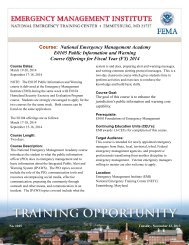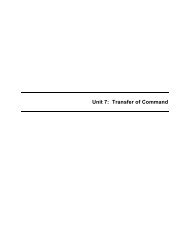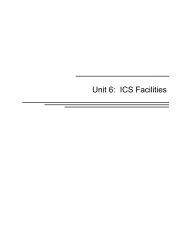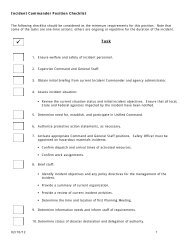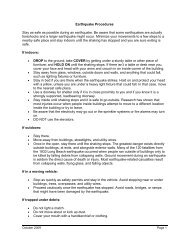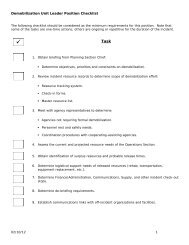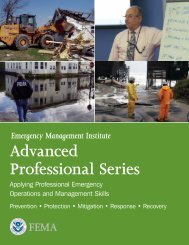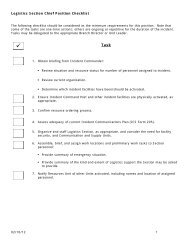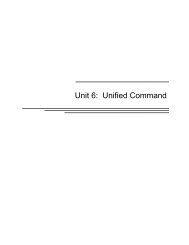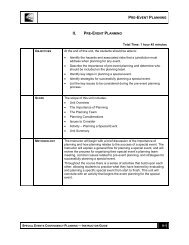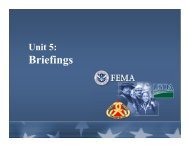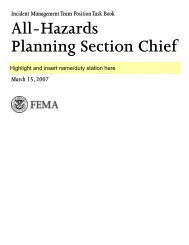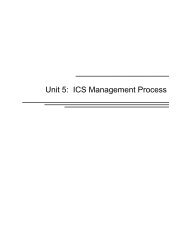EMI Course Catalog - Emergency Management Institute - Federal ...
EMI Course Catalog - Emergency Management Institute - Federal ...
EMI Course Catalog - Emergency Management Institute - Federal ...
Create successful ePaper yourself
Turn your PDF publications into a flip-book with our unique Google optimized e-Paper software.
INDEPENDENT STUDY<br />
COURSES<br />
EmErgEncy managEmEnt InstItutE • 2011-2012 • catalog of coursEs<br />
Workplace Violence Awareness Training<br />
(IS-106 .11)<br />
This course gives employees awareness of how to<br />
recognize the warning signs of potential violence in<br />
the workplace and what actions to take to prevent or<br />
minimize violence.<br />
Selection Criteria: It is required for every FEMA<br />
Disaster Reservist to take this course annually. For<br />
Permanent Full-Time (PFT)/Cadre of On-Call<br />
Response Employees (CORE) employees, it is a<br />
onetime requirement unless the course is revised.<br />
CEUs: .1<br />
Study Hours: 1<br />
NOTE: This course code contains a “calendar-year” extension<br />
in order to allow FEMA staff to retake the course as a recurring<br />
requirement. Beginning on January 1, 2012, the course code will<br />
be IS-106.12.<br />
FEMA Travel Rules and Regulations 2011<br />
(IS-107 .11)<br />
Fulfilling our mission requires that we are ready to<br />
travel at a moment’s notice. Part of being prepared<br />
requires that you gain an understanding of <strong>Federal</strong><br />
travel rules and regulations. This course presents<br />
an overview of FEMA rules and regulations on<br />
employee travel, including eligible and non-eligible<br />
expenses. It is designed to prepare personnel with<br />
information on FEMA travel rules and regulations<br />
that are required to be followed when working for<br />
FEMA. These regulations help facilitate travel, ensure<br />
accountability, and meet the unique needs of the<br />
disaster workforce while they serve our Nation.<br />
Selection Criteria: This course is mandatory for all<br />
FEMA Reservists every calendar year and is strongly<br />
suggested for all FEMA employees, especially those<br />
who travel frequently. (This replaces DF-502, FEMA<br />
Travel Rules and Regulations.)<br />
CEUs: .1<br />
Study Hours: 1<br />
FEdErAL EmErgENCy mANAgEmENT AgENCy 158<br />
NOTE: This course code contains a “calendar-year” extension<br />
in order to allow FEMA staff to retake the course as a recurring<br />
requirement. Beginning on January 1, 2012, the course code will<br />
be IS-107.12.<br />
Livestock in Disasters (IS-111)<br />
This Independent Study course is for farmers, extension<br />
agents, emergency managers, and others who<br />
have interests in the livestock industry. It describes<br />
the various hazards that animals can face and how<br />
to mitigate for them, as well as how to respond<br />
to an actual disaster. The livestock industry is a<br />
multi-billion dollar business that provides food<br />
for the American people as well as for those overseas.<br />
It is important to ensure our livestock are safe<br />
from hazards and will not suffer from the effects<br />
of hazards. This course can be downloaded from<br />
the Independent Study web site and the test can be<br />
completed and submitted online.<br />
CEUs: 1.0<br />
Study Hours: 10<br />
An Introduction to Exercises (IS-120 .a)<br />
This Independent Study course introduces the basics<br />
of emergency management exercises. It also builds<br />
a foundation for subsequent exercise courses which<br />
provide the specifics of the Homeland Security<br />
Exercise and Evaluation Program (HSEPP) and the<br />
National Standard Exercise Curriculum (NSEC).<br />
IS-120.a, An Introduction to Exercises, replaces IS-120, An<br />
Orientation to Community Disaster Exercises. At the end of<br />
this course, participants will be able to:<br />
• Identify the five phases of the exercise process.<br />
• Distinguish the tasks necessary to complete each<br />
phase of the exercise process.<br />
• Understand how exercises complete the<br />
emergency preparedness cycle.<br />
• Comprehend the role of exercises in the testing<br />
of facilities, equipment, and personnel in a<br />
performance-based environment.<br />
• Recognize how exercises prepare communities to<br />
respond to and recover from major emergencies.



